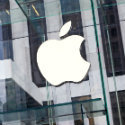A TV alliance between the iPhone maker and the South Korean tech giant points to a weakening of Apple's position as a hardware and software giant.

The rivalry between Apple and Samsung has been one of the most acrimonious the tech sector has known this century. After Apple accused Samsung of ripping off smartphone designs, the two companies fought a seven-year patent war that ended as recently as mid-2018, when Apple was awarded hundreds of millions of dollars in settlement fees. (See Apple Wins $539M in Samsung Patent Dispute.)
So the news of a partnership between the companies from this week's Consumer Electronics Show (CES) in Las Vegas has taken parts of the industry by surprise. Starting this spring, consumers will be able to watch movies and TV shows from Apple's iTunes service on TVs made by Samsung Electronics Co. Ltd. (Korea: SEC). New TVs will come with default support for iTunes, while 2018 models will be able to screen Apple's service after a firmware upgrade. Still fierce competitors on the smartphone stage, Apple Inc. (Nasdaq: AAPL) and Samsung are snuggling up to enjoy TV together. (See Samsung to Bring iTunes Movies, TV Shows to Smart TVs.)
While few may have seen the alliance coming, it makes good sense for both firms. As a maker of Internet-enabled smart TVs, South Korea's Samsung faces growing competition from other hardware manufacturers such as Sony, Panasonic and local rival LG. Providing support for additional content platforms is one way for Samsung to ward off the competition. While its TVs can already handle Amazon Prime and Netflix Inc. (Nasdaq: NFLX) -- the world's biggest Internet TV services -- iTunes has been missing from the stable. Nor does the tie-up pose much threat to Samsung's own services business, which has struggled to mount a serious challenge in the TV market.
But the deal may have even greater significance for Apple as it tries to offset a slowdown at its devices business with growth in services. Last week, CEO Tim Cook rattled investors with his warning that fiscal first-quarter revenues (covering the October-to-December period) would fall well short of previous expectations. Unimpressed with the latest iPhones, and Apple's move to raise prices, many consumers appear to be sticking with their current devices. Because Apple derives about 60% of its revenues from the iPhone, that lack of enthusiasm has hit the company hard. (See iPhone Upset Leads to Apple Crumble and Apple Really Is in Trouble This Time.)
Revenues from services have continued to rise sharply, however. In the first quarter, they were up 27% compared with the year-earlier period, to around $10.8 billion, according to an update from Cook. Unfortunately, that is only about 13% of total sales. While services are popular, many are restricted to Apple's own hardware. Watching movies and TV shows from iTunes on non-Apple devices has not been straightforward, for instance. That has limited the size of the addressable opportunity.
Such walled gardens may now be collapsing, says Paolo Pescatore, an independent tech, media and telco analyst attending this week's CES. "For Apple, this suggests a change in focus on making its services available on rival platforms rather than tightly integrating them into its own devices," he said in emailed comments. "Samsung is better placed than rivals to act as an aggregator given its broad distribution reach. For this reason, it will provide a much-needed revenue boost for Apple."
Want to know more about the impact of Web services on the pay-TV sector? Check out our dedicated OTT services content channel here on Light Reading.
Even so, a shift in the services strategy has been underway for several years. Indeed, Apple is reported to have first opened its iTunes store up to the PC market way back in 2003, several years before the iPhone appeared. Apple Music, its music-streaming answer to Spotify, became available on the Amazon Echo smart speaker just a few weeks ago. Since it was launched in 2015, Apple's music service has also been available to users of Android handsets.
But if Apple has more to gain than Samsung from the latest partnership, it may also face a bigger risk. In a market where hardware makers and software developers are often distinct entities, Apple has stood out as a company responsible for both. Apple's control over both hardware and software features partly explains why its gadgetry and services rarely malfunction, say proponents. That could change as services are made available on a variety of hardware platforms, with potential consequences for Apple's reputation.
That an alliance with Samsung would have been inconceivable two or three years ago shows that Apple's hardware star has fallen. Beyond the iPhone, it has failed in recent years to innovate as it did in the era of Steve Jobs, its founder and erstwhile CEO. With its own compelling smart speaker or smart TV, Apple would probably have resisted deals with Amazon.com Inc. (Nasdaq: AMZN) and Samsung. But without a hardware role in those markets, Apple needs these companies as much as they need Apple's services.
— Iain Morris, International Editor, Light Reading
Read more about:
AsiaAbout the Author(s)
You May Also Like





.jpeg?width=300&auto=webp&quality=80&disable=upscale)





